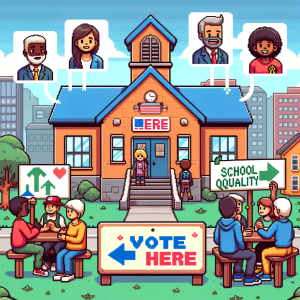
The Crucial Role of Education in Fostering Civic Values: A Look at Private vs. Public Schools
It’s been a minute since a study made me stop and go “huh?”.
Education has long been recognized as a fundamental pillar in cultivating democratic citizens. Historical debates have often centered on whether public or private schools are better equipped to nurture the civic virtues necessary for a thriving democracy. In light of recent disappointing civics test scores across the U.S., where only a fraction of students demonstrated proficiency, the urgency to bolster our educational approaches has never been more apparent.
A New Insight into Civic Education
A groundbreaking statistical meta-analysis recently shed new light on this age-old debate, assessing the impact of private schooling on civic outcomes such as political tolerance, participation, civic knowledge, and community engagement. The analysis, drawing from a vast dataset of over 13,000 studies, concluded that private schools, on average, enhance civic outcomes more effectively than their public counterparts.
What Does This Mean for Our Children and Communities?
For parents and school mental health professionals, these findings are particularly relevant. They suggest that the choice of school can play a significant role in a child’s development as a well-rounded citizen who is knowledgeable, tolerant, and actively participates in society. This could influence decisions parents make regarding their children’s education, aiming for environments that not only focus on academic excellence but also on civic engagement.
Breaking Down the Results
- Political Tolerance: Private schools, especially religious ones, seem to foster greater tolerance among students, preparing them to respect diverse viewpoints in our increasingly pluralistic societies. This, to me, was super-counter intuitive.
- Political Participation and Knowledge: The study also points to higher levels of political knowledge and skills among students from private schools, which is crucial in a time when factual understanding of governmental processes and civic duties is waning.
- Community Engagement: In terms of volunteering and building social capital, private schooling has a noticeable edge, which might be tied to the strong community-oriented ethos often found in these educational settings.
Implications for Future Educational Policies
These insights are crucial for educational policymakers and stakeholders in crafting strategies that ensure schools are effective in imparting necessary civic skills. There is a strong case for encouraging educational models that emphasize civic education and parental involvement as central to curriculum design.
Engaging the Audience: A Call to Action
As readers, especially those involved in education or parenting, your engagement and discussions about these findings are invaluable. What have been your observations regarding civic education in your community’s schools? How can we collectively ensure that our educational institutions serve not only as places of academic learning but also as environments that foster active, informed, and tolerant citizens?
Conclusion
The debate between public and private schooling regarding civic outcomes is complex and nuanced. I”m a product of parochial school, but a strong champion of public education. However, this latest research provides compelling evidence that private schooling, with its emphasis on individual values and community engagement, may offer effective pathways for cultivating the civic virtues needed in our democratic societies.
Join the Educational Revolution!
Begin your adventure with This Week in School Psychology for only $5 a month or $50 annually. Be at the forefront of educational breakthroughs and mental health insights. Subscribe to become a beacon of knowledge in your community, simplifying the complex world of educational research. Why wait? Ignite your passion for learning today and enjoy exclusive savings with our annual plan!



